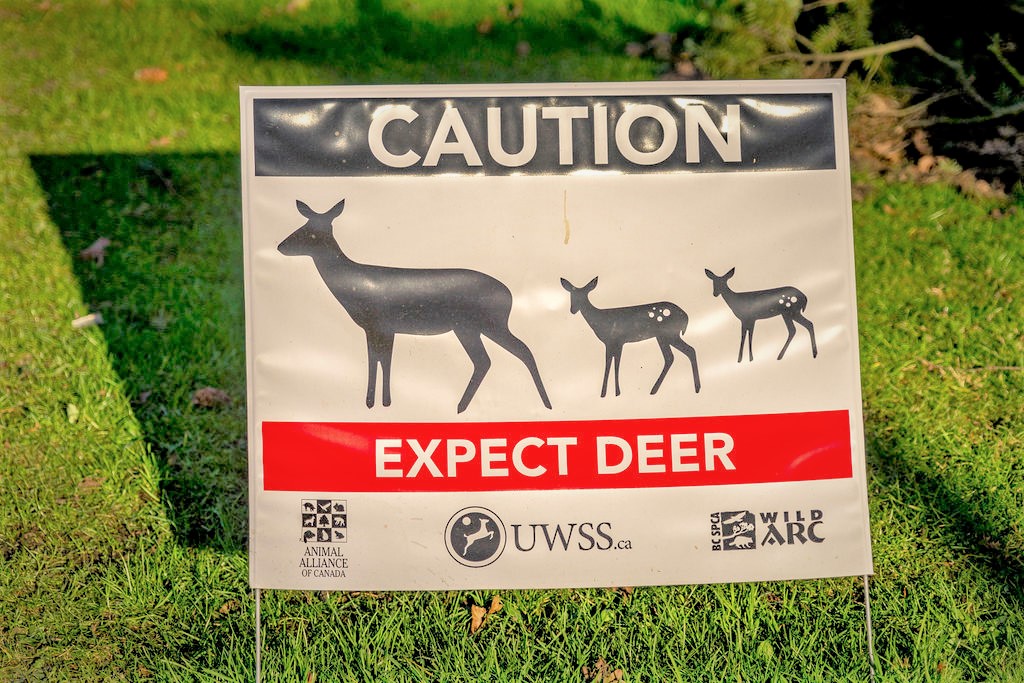Urban deer study
After the prescribed three-year deer survey and in consultation with local First Nations, the Ministry of Forests, Lands, Natural Resource Operations, and Rural Development has granted the permit required to participate in studying the efficacy of immunocontraception on deer. The research is being done by the University of Victoria Applied Conservation Macro Ecology (ACME) Lab in partnership with the Township of Esquimalt.
The Esquimalt Urban Deer Project team has successfully vaccinated the majority of female deer (does) in the Township.
Between 2021 and 2023, they tagged 20 control does and 60 treatment does. The 60 treated does received the PZP-22 birth control vaccine, which provides contraception for 22 months. After this period, booster vaccinations are required to maintain their maximum effectiveness.
The deer study continued throughout 2024 with further monitoring, data collection and analysis of previous years data. Full analysis will continue in 2025, with project results expected in fall 2025.
More information about the progress of the study can be found at acmelab.ca/esquimaltdeer. Questions or concerns can go to 778-729-2509 or acmelab.uvic@gmail.com
Urban deer in Esquimalt
Columbian black-tailed deer are native to B.C., ranging from the central coast of BC along the coastline into California. They’re part of the natural environment that makes Esquimalt such an extraordinary place to live.
Black-tailed deer thrive near forest edges, using the underbrush for foraging and cover. Wooded urban environments like golf courses, parks and roadside greenbelts are common places to find them making them a common sight in Esquimalt.
Their main food item is browse (the growing tips of trees and shrubs) but will also consume fruit, nuts, acorns, fungi, and lichens.
Report: Population Estimate Survey of The Columbian Black-tailed Deer in Esquimalt, BC
More information about urban deer in Esquimalt and in Greater Victoria: https://uwss.ca/
Find general information on urban deer and other wildlife
Human-deer conflicts
Due to the abundance of deer in Esquimalt, you may come across them in your backyard, or while walking, cycling and driving. There are several ways to reduce the impacts of these conflicts like making your yard deer-resistant, slowing down in areas where deer are frequent, and understanding how to react when encountering a deer.
The best way to avoid potential conflict with deer is to avoid attracting them in the first place. To discourage deer from bedding down:
- Don’t feed deer: don’t leave food out for deer, keep pet food indoors, clean up fallen fruit & birdseed, selective deer-resistant planting
- Prevent access: repair holes in fencing, use garden barriers around accent plants or fruit trees, repellents, noisemakers, and scarecrows all dissuade use of your yard
- More information can be found here.
Injured or deceased deer
If you find an injured deer, contact Urban Wildlife Stewardship Society or BC SPCA Wild Animal Rehabilitation Centre (Wild ARC).
If you find a deceased deer on your property, you are responsible for having it removed and disposed of. Contact your preferred waste removal company.
If you find a deceased deer on municipal property, please contact Esquimalt public works at 250-414-7108 or submit the information online.
Signs
 Residents that would like to erect a sign on their property to warn drivers of potential deer conflicts can order them through the Urban Wildlife Stewardship Society.
Residents that would like to erect a sign on their property to warn drivers of potential deer conflicts can order them through the Urban Wildlife Stewardship Society.
For more information on human-wildlife conflicts, please see the Urban Wildlife Stewardship Society or BC SPCA Wild Animal Rehabilitation Centre (Wild ARC) websites.
